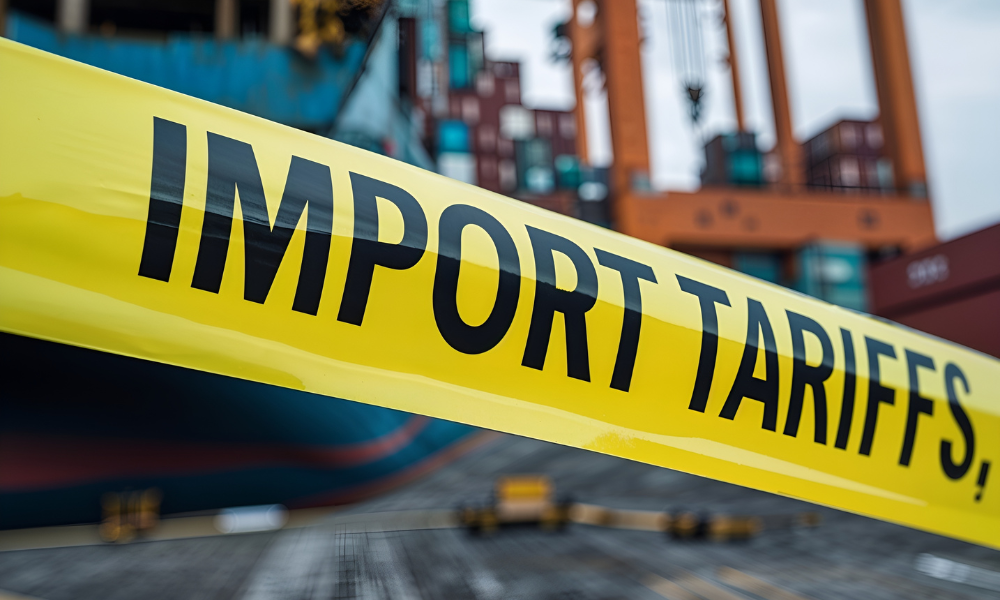Canada avoids baseline tariff but braces for auto, aluminum and fentanyl-linked duties from US

On what he called “Liberation Day,” US President Donald Trump announced wide-ranging reciprocal tariffs, including a baseline 10 percent levy on all imports.
According to BNN Bloomberg, a fact sheet from the White House clarified that Canada is exempt from the baseline tariff, though a 25 percent tariff remains in place on Canadian non-compliant CUSMA goods and foreign-made cars.
Non-compliant energy and potash face a 10 percent tariff.
Carney pledges response, cabinet holds emergency meetings
Prime Minister Mark Carney committed to fighting US tariffs still affecting Canadian goods.
He said, “We are going to fight these tariffs with countermeasures,” and stressed the need to act “with purpose and with force.”
Carney paused his campaign to hold closed-door meetings with ministers and the Canada–US Council.
The Prime Minister’s Office said Canada did not receive advance notice of the targeted sectors.
US Senate rebukes Trump’s tariff powers, but resolution unlikely to pass
The US Senate passed a resolution 51–48 to nullify Trump’s emergency powers that underpin tariffs on Canada.
Trump, in a Truth Social post, criticized four Republicans—Lisa Murkowski, Susan Collins, Mitch McConnell, and Rand Paul—for supporting the measure.
While symbolic, the resolution is not expected to pass in the House or be signed into law.
View this post on Truth Social
Auto, steel, and aluminum industries brace for impact
Tariffs on foreign-made cars begin at midnight, and duties on auto parts will follow on May 3. US officials confirmed that exemptions for Canadian vehicles are temporary.
Aluminum-producing towns like Arvida in Quebec, responsible for one-third of national output, expressed concern.
In New Brunswick, forestry leaders said further tariffs would disrupt prices and possibly drive producers out of business. Meanwhile, the United Steelworkers union reported 350 layoffs due to steel and aluminum tariffs imposed on March 12.
Fentanyl-linked levies resurface amid Trump’s broader tariff rollout
Trump linked tariffs on Canada to fentanyl trafficking, despite US data showing minimal seizures at the northern border.
In the same Truth social post, Trump suggested tariffing the drug “to make it more costly to distribute and buy."
Earlier tariffs connected to fentanyl were partially paused but were set to return Wednesday, with a two-month reprieve expiring the same day.
Political responses across Canada
Carney spoke with Mexican President Claudia Sheinbaum to co-ordinate a response to what both leaders called “unjustified trade actions.”
Conservative Leader Pierre Poilievre called for targeted reciprocal tariffs and proposed a “keeping Canadians working fund” for businesses directly hit.
He pledged to renegotiate trade terms if elected. NDP Leader Jagmeet Singh pledged to protect workers, expand EI, and establish a “no-trade clause” on critical services.
Ontario Premier Doug Ford said Canada would remove retaliatory tariffs if the US ended its trade war.
Economic outlook and market reaction
The S&P/TSX index closed up 273.90 points at 25,307.18. US markets ended higher, with the S&P 500 up 37.90 points, the Dow up 235.36, and the Nasdaq up 151.16.
Gold prices neared a record, peaking at US$3,149 before closing at US$3,119.89 per ounce.
Western Canadian Select oil traded at its narrowest discount to WTI in four years, raising concerns for US refiners reliant on Canadian supply.
Business and production outlook in Canada
A PWC Canada survey found that 97 percent of firms in the manufacturing and automotive sectors are exposed to tariffs. About 37 percent said they are considering moving operations to the US.
Some Canadian companies have begun stockpiling inventory, cutting jobs, delaying forecasts, and changing suppliers in response to trade uncertainty.
Trump outlines full list of reciprocal tariffs by country
Trump announced a detailed list of tariffs: 46 percent on Vietnam, 44 percent on Sri Lanka, 37 percent on Bangladesh, 34 percent on China, 32 percent on Indonesia and Taiwan, 25 percent on South Korea, 24 percent on Japan and Malaysia, and 10 percent on the UK, among others.
He said the US would impose tariffs to match or approximate what other countries charge American goods.
Republican and Democratic backlash in US
US Senators Rand Paul and Chuck Schumer criticized the tariffs. Paul argued they were unconstitutional, while Schumer said they would cost Americans US$5,000 each and trigger recessions in border cities.
US Senator Tim Kaine said tariffs were not a fentanyl solution and co-sponsored a bill to revoke them.
Quebec’s language law labelled a US trade barrier
The US Trade Representative listed Quebec’s Bill 96 as a barrier to US exports in its 2025 foreign trade report. The legislation, which affirms French as the province’s official language, was flagged for potentially hindering trade and investment.
Tourism and agriculture sectors report growing concerns
Visit Buffalo Niagara reported a 14 percent decline in Canadian visitors in February, citing trade tensions.
The Canola Council of Canada warned that Canadian canola faces a double tariff threat from both the US and China. In 2024, the two countries imported $12.6bn of Canadian canola products.
Wall Street trends and pricing effects
Western University’s Andreas Schotter said prices could rise between 10 and 50 percent due to inflation and a weakening Canadian dollar. Sectors at risk include automobiles, gas, electronics, and processed food.



